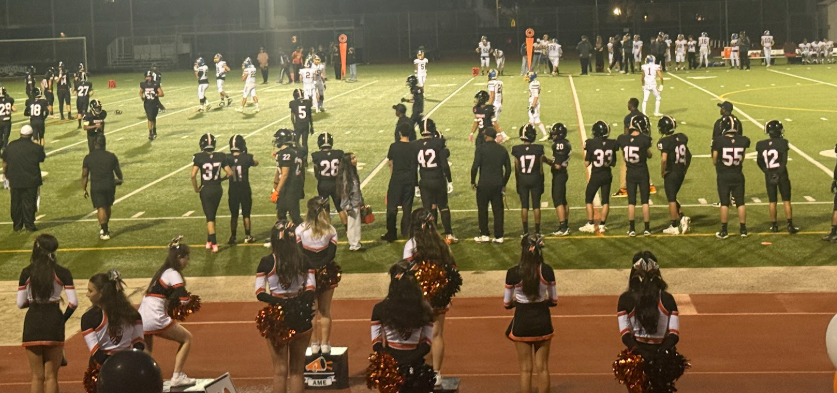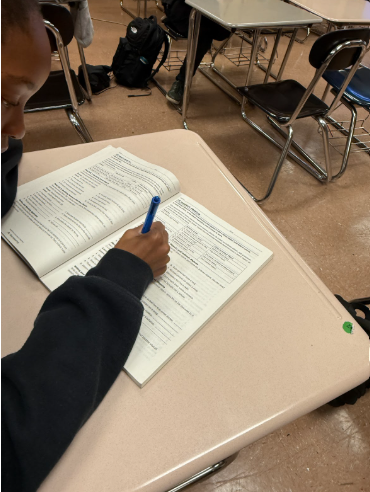Jackson Prince, staff writer

On the streets of Rome in the summer of 2013, an amalgamation of European teenagers, visiting Londoners and native Italians, crowded around a boom box that blasted the now-familiar but then-mystifying primal tune, “Eh eh oo eh oo,” otherwise known as the first five seconds of the song, “Pompeii,” by Bastille. Clearly, they had discovered something very special.
Released in America in September, Bastille’s first album, “Bad Blood,” quickly found its way onto many Yankee Spotify playlists, CD trays, iPods and record players (because vinyl is always the answer).
The album as a whole tells of the loss of old friends and relationships. If listening to an album can be called a “journey”, then “Bad Blood” is a journey within a journey. A “journey-ception,” if you will. The lyrics are written with a wisdom beyond the years of the young men in the band and include interesting metaphors and allusions which include references to Icarus and Daniel in the lion’s den. The music is defined by its many variations of percussion, as well as memorable hooks with profound lyrics.
Because everyone deserves the opportunity to discover music on their own, here’s a review of only seven of the album’s 15 tracks, along with a link to each song to give you the opportunity to craft your own opinion. Rated on a system of one to 10, one being “bloody dreadful” and ten being “heavenly”, here are some favorite songs from the British band’s debut album, “Bad Blood.”
Pompeii – 10/10
Pompeii, or the “Roman city of sin” infamously known for its brothels and alcohol, was the victim of the explosion of Mt. Vesuvius in 79 A.D. Described as a conversation between two bodies trapped beneath the rubble, the mini-epic song “Pompeii” explores whether changes occur if one’s eyes are shut. The dramatic allusion to a major historical moment gives the song meaning, but another key contributor to its success is its primal sound. Using their own voices to create the beat, Bastille also adds forceful drum progressions that give the song power. Lead vocalist Dan Smith’s compelling voice is backed by a chorus of harmonizing echoes, adding to the song’s intensity. It’s quite difficult to compare this song to anything else on the market, a song like “Pompeii” has simply never been done before. It’s near perfect; simply crafted, but intricately rewarding. Check out the “Pompeii” music video here.
Things We Lost in the Fire – 7/10
Then, on the second song of the album, Bastille throws the listener an early curveball. In “Things We Lost in the Fire,” Bastille takes advantage of many sources of sound, notably adding a delicate but persistent keyboard stroke while maintaining its penetrating drumbeats and choral backdrop. The song, written about a friend’s house that burned down, contains the elaborate metaphor of a burnt-down relationship, in which the couple struggles to locate and pick up the lost pieces. The sultry sounds in the first verse are followed by a gradual buildup to the heights of a relationship burning itself out, and then a gentle dissolve to its tragic end. “Flames, they licked the walls/tenderly they turned to dust all that I adore”. Bastille’s portrayal of the gradual destruction of a relationship is smartly done and, though it may lack the penetrating force of “Pompeii,” the song is still one of their better tracks because of the tragic beauty throughout. Here’s the “Things We Lost in the Fire” music video.
Get Home – 9/10
Upon listening to this song, one may discover that Bastille is more than just a popular music group. They are artists. They take advantage of auto-tuning in this masterpiece, using cold, digitally-mastered voices to harmonize with Smith’s more acoustic and human warmth. Kind of like the song itself, in which the lyrics describe the heartbreak felt at the cold dawn and the addiction to the heat of the ever-repeating nights. The momentum of “Get Home” and the musicality of the entire song puts one into a state of one’s own feeling lost, and a longing to get back to one’s metaphorical home. Just listen, its brilliance is hard to explain. Find the “Get Home” music video here.
Bad Blood – 6/10
The album’s purpose is defined in this song that shares the album’s title. In “Bad Blood,” the message of “growing apart from people you grew up with” is made blatant, as Smith begs his drifting friend to “let [the bad blood] lie.” Smith’s stated desire to move on is played against a musical backdrop of wave-like rhythms and progressions. He’s not angry, despite the “bad blood” in the lyrics. He’s almost pleading, accompanied by an anthem-like instrumental support system. The song is emotionally driven and it ties the album together nicely. However,it lacks the cleverness of Bastille’s more sophisticated songs. Check out the “Bad Blood” music video here.
Laura Palmer – 7/10
At first, one might avoid “Laura Palmer,” put off by the unfamiliar title of the song. But, to those uneducated in the art of television re-runs, an explanation. Based on a 1990s TV show called “Twin Peaks,” the band wrote this piece about the show’s main character, Laura Palmer, who was (spoiler alert) murdered by her father. The song begins with a progression eerily similar to that of “Mirror” by Lil Wayne. This sets the tone of the song, as – like the character of Laura Palmer – sexy and mysterious. However, the mystery is erased at the chorus, when the band asks the rhetorical question, “Can you feel it pumping through your veins?” For some, it may take too long to get to the climactic musical release. But the buildup builds musical character. Here’s the “Laura Palmer” music video.
Weight of Living, Pt. I – 9/10
An “albatross” is often a metaphor for a curse, something that hangs around one’s neck for one’s entire life. Bastille tells us that it’s “all the things… said and the things… done.” Although this sounds a bit ultra-literate, stay with me. This is perhaps the simplest musical track on the album, and also the most satisfying. “Weight of Living, Pt. 1” is relatable, as Bastille begs the listener to “shoot down” the albatross. It’s a feel good-er, as the band puts on a different face for the song. The ingenuity of the message and metaphor, as sung by Smith and played by the band, create a musical environment in which one may truly shed “the weight of living”. Here’s a link to “Weight of Living, Pt. 1.”
Oblivion – 7/10
Bastille’s closest version of a ballad is “Oblivion.” It makes use of the synth in a seemingly random, but clearly controlled pattern. In fact, it’s Smith’s control of the song which delivers. He shows off his range and versatility as a singer. The song is deep and intricate, and breaks the heart of the listener as the tragically beautiful picture of a couple falling into the abyss is painted. With each “Are you going to age with grace?” our hearts crack a little deeper. Find “Oblivion” here.
“Bad Blood” earns an 8.5/10, which is an auspicious start for a brand new band. Expect greater things to come from Bastille.
If you’re craving more Bastille not reviewed above, try “Daniel in the Den,” “Icarus,” “These Streets” and “Overjoyed.”
































